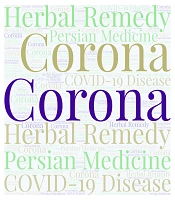Dear Editor,
Since December 2019, severe acute respiratory syndrome coronavirus 2 (SARS-CoV-2), commonly known as COVID-19, has emerged as a significant worldwide health event, with a mortality rate ranging from 0.5% to 15% (1). There is no specific medication for the disease yet, making managing COVID-19 a major challenge for the health system. In this regard, the claims on the efficacy of traditional, complementary, and integrative medicine (TCIM) have become more prominent for preventing and treating COVID-19 (2, 3). Conversely, some believe that medical hadiths and narrations in Islam, also known as Islamic medicine, can be used to prevent and treat diseases such as COVID-19. One of the popular medications among these people is a polyherbal hand-made remedy, referred to as Imam Musa Kazem (PBUH) medication, containing Terminalia chebula (myrobalan), Foeniculum vulgare (fennel), and Saccharum officinarum (natural brown sugar). This medication was presented in a few sources of Islamic texts (4), but there is currently no epidemiological evidence to support its use in the Iranian population.
A cross-sectional study of COVID-19 patients in Shiraz, Iran, from February to June 2020 revealed that up to 70% of patients used TCIM to treat their COVID-19 symptoms (5). This report presents the prevalence and related epidemiological factors for taking Imam Musa Kazem (PBUH) medication among COVID-19 patients. Specifically, 400 COVID-19 patients (189 women and 211 men) confirmed by polymerase chain reaction (PCR) testing participated in the study. According to the results, 57 patients, including 25 women and 32 men (prevalence: 14.25%, 95% confidence interval (CI): 0.11 to 18), reported consumption of this polyherbal drug. The mean age of the patients who used this remedy was 44.12 ± 12.95 years old, being significantly younger than those who did not consume this remedy (mean difference (MD): 7.03, P = 0.001; standard mean difference (SMD): 0.46 (95% CI: 0.17 - 0.74)). Additionally, the findings indicated that 38 patients who used this medication did not require hospitalization for COVID-19, although this difference was not statistically significant (P = 0.29, odds ratio (OR): 0.73; 95% CI: 0.40 - 1.31). While there was a 93% higher tendency for urban residents to use this polyherbal medication than their rural counterparts, the difference was not statistically significant (P = 0.519, OR: 1.93; 95% CI: 0.55 - 6.77). Although the likelihood of using this medication was 89% higher among single patients than married ones, the difference was not deemed statistically significant (P = 0.158, OR: 1.89; 95% CI: 0.95 - 3.79). Additionally, the findings indicated that there was no statistically significant difference in terms of hospital length of stay between patients who utilized this remedy and those who did not (P = 0.826, MD: 0.24, Cohen's d = 0.06; 95% CI: -0.44 - 0.55). It is of great concern that all patients reported receiving this medication from a non-medical practitioner.
Although this study did not determine anything about the efficacy or safety of this polyherbal medication, some people tended to use this hand-made and unapproved remedy to prevent or treat COVID-19 without substantial evidence-based documentation or clinical trials. Deceiving and misleading individuals by religious impulses is an inexcusable wrongdoing that could place many people at severe risk. Although some recent studies showed promising effects on the therapeutic role of components of this medication for COVID-19 management (6-8), there is no strong clinical evidence to endorse this hypothesis. Moreover, there is no convincing evidence in Persian medicine sources to support the use of this polyherbal remedy. Therefore, it is recommended that patients with COVID-19 should refrain from using TCIM medications or following recommendations for which there is insufficient evidence regarding their efficacy or safety. In conclusion, designing well-designed randomized clinical trials with large sample sizes and rigorous methodology is highly recommended to evaluate the efficacy and safety of this remedy for the prevention and treatment of COVID-19.
